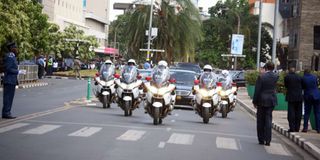Eric Ng’eno: With friends like these, a head of state will hardly need any enemies

Uhuru Kenyatta’s presidential motorcade on a city road. There is an exploding sector comprising vehement men and women who have appointed themselves the president’s protectors.
It is not true, of course, that under the merciless battering of our inclement straits, every sector has been on the decline. But every cloud has a silver lining. In this regard – to employ a hackneyed expression of Government Square – one growth sector has distinguished itself for its resurgence and momentum.
I refer to the recently exploding sector comprising vehement men and women who have appointed themselves the president’s protectors, helpers and interpreters.
This spectacular menagerie exploded into the scene as zealous, self-appointed custodians of the president’s thought and will. Additionally, they proclaimed themselves the exclusive evangelists of his agenda, protectors of his honour and curators of his legacy.
On this mission, they thrust themselves into the front and centre of national consciousness, with feverish proclamations of loyalty and risible demonstrations of readiness to go to any lengths on behalf of their patron.
In their reign of terror, they have gone hammer and tongs at all perceived enemies of their leader, and never hesitate to designate new official enemies to keep them occupied.
To profile themselves most advantageously, they stage tawdry performances of loyalty and efficiency.
As perplexed casualties fall by the wayside, it has been amusing to observe the laborious melodrama and deepening solemnity with which they address Kenyans. In time, many a project and programme, launched with momentous effusions and usually priced exorbitantly, invariably goes the General Potemkin way.
Horrifying
The glee with which these individuals haunt and hound any perceived or arbitrarily designated enemy of the president is both horrifying and ludicrous. They never cease proclaiming that they are helping the president, or to menacingly demand respect on his behalf.
Naturally, in the process, these delirious functionaries have immersed themselves in stupendous state resources, acquiring immense capability to “get things done,” and bolstering their power and prestige in the process.
The trappings of favour and access are visibly displayed as these wonders strut and preen, steeped in the pomp and ceremony that comes with entrusted public authority.
What bothers me about these people is their utter obliviousness, not only of the subtext implicit in all they have left unsaid, but also to the implications of their actual utterances and actions.
First of all, their entire performance is attached to a logic that strategically frames the President as incapacitated, besieged or overwhelmed, thus necessitating the rescue effort. The accompanying narratives are telling. Usually, they suggest that the head of state is a good man captured by unsavoury allies, or surrounded by inveterate delinquents, and requires urgent emancipation. They ultimately do not redound brilliantly to the President’s credit.
The entire repertory of guardianship — helping, defending and explaining the head of state — is, in fact, a diabolically self-serving confidence trick masquerading as loyalty and devotion. Its utility lies in that it all creates a role for its perpetrators and justifies their claims for access to state power.
Ultimately, the idiom of presidential guardianship, as it were, is disrespectful, nay, contemptuous in that it employs the name of the president as a powerful instrument of self-help.
Moreover, it purloins the privileges of state authority to access impunity, as these delirious functionaries pursue their personal ends, dealing with their personal enemies and demanding respect and obedience, in the president’s name.
They strongly suggest that without them, the president and his government would be in far deeper trouble, if not out of it entirely, and that the country needs them. In time, this fictive indispensability is propounded with an arrogant swagger and snarling entitlement as the guardians become rapidly intoxicated with their fraud.
Violent repression
In the end, the guardians benefit themselves immensely, but also elicit visceral public resentment, which extends to the government and, God forbid, even the president. Their rough-shod, hell-for-leather rampage of impunity and violent repression, the vile deceit and inherent corruption of their enterprise, and their absolutely nauseating public comportment create onerous political liabilities for the president.
It is not that these folk are unaware of the consequences of their horrid orgies; no one is ever that dense. Rather, they do not care. They are not loyal, and neither esteem nor care enough about their “ward” to worry about such scruples. Yet there they are, forcefully exhorting the president to be ruthless, and urging him to emulate this or that stylised executive precedent.
Times without number, the President has been cajoled, like some callow punter in need of moral support, to be bold or brave, or not to be intimidated. These repulsive performances are aimed at provoking a reckless course of action.
As the going gets tougher in Kenya, and moments of reckoning approach inexorably, it will be interesting to witness the fortunes of various self-appointed presidential guardians. With friends like these, one hardly needs enemies.
@EricNgeno





